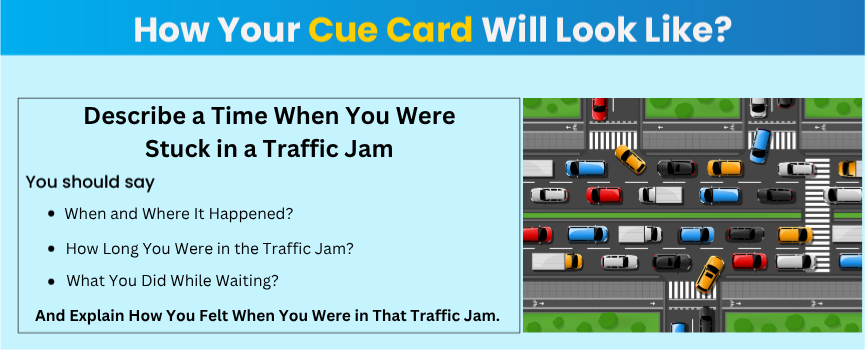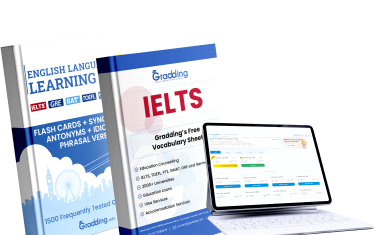Describe A Time When You Were Stuck In A Traffic Jam - IELTS Cue Card
Last updated: Jul 8, 2025The IELTS exam is one of the most crucial tests when planning to study abroad. The cue card task is the second part of the speaking test after the introduction round. This task assesses your spoken language skills; thus, it is essential to prepare well for this part. Read the blog, which contains IELTS cue card “Describe a Time When You Were Stuck in a Traffic Jam” samples, along with the follow-up question. Additionally, the write-up also mentioned how to answer the cue card and some helpful tips to excel in the IELTS speaking section. Moreover, by understanding the purpose and format of IELTS Cue Cards and implementing effective preparation strategies, you can confidently address this section and improve your overall IELTS Speaking score. So let us first begin by understanding all about cue cards.

Table of Contents
Introduction to IELTS Cue Cards
The Cue Card round in the IELTS Speaking part 2 is a key component, which is also known as the "Individual Long Turn". This section assesses your ability to speak at length on a particular topic. It demonstrates your fluency, coherence, vocabulary, and grammar skills. Moreover, the Cue Card section contributes significantly to your overall speaking score.
A prompt, along with a few specific pointers will be provided in this task. Usually, these cue cards ask you to describe a place, person, or experience in a minute or two. Apart from the speaking time, you will also get one minute to prepare your response. After your long turn, the examiner may ask one or two follow-up questions related to the Cue Card topic.
How to Answer the Cue Card?
To effectively answer cue card questions in the IELTS speaking section, you must first begin by understanding the topic and the pointers given on the card. Further, utilize the preparation time to structure your response with keywords, and then speak naturally and clearly. Besides, it is important to elaborate on the details, examples, and personal experiences related to the topic.
Moreover, your answer to “Describe a Time When You Were Stuck in a Traffic Jam” must include the following pointers:
- When and Where It Happened?
- How Long You Were in the Traffic Jam?
- What You Did While Waiting?
- and Explain How You Felt When You Were in That Traffic Jam.
The IELTS speaking part 2 response is evaluated on the basis of the flow of the content, grammatical range, punctuation, fluency, and coherence. Thus, it is essential to use appropriate grammar, such as idioms, phrases, and more, in your response. You will get a minute to prepare your thoughts and then speak for two minutes on the topic. Now, let us see what the cue card looks like.

Describe a Time When You Were Stuck in a Traffic Jam - Sample 1
Here is a sample of the IELTS speaking section on the topic describe a time when you were stuck in a traffic jam for your reference.
Introduction
Nowadays, due to the rapid growth of the population and the increase in the number of vehicles, getting stuck in traffic jams has become a common thing. Especially in Tier II cities, where there is limited road space or narrow roads.
When and Where It Happened?
I remember being stuck in a terrible traffic jam yesterday when I was going to take an important exam. It was a Monday morning, typical rush hour, and my exam center was located in the city center. The roads were packed with vehicles, moving slowly like snails.
How Long You Were in the Traffic Jam?
It took me at least 30 minutes to cover just 1 km. All in all, I was stuck in the jam for approximately an hour and a half.
What You Did While Waiting?
But while waiting, I played some music to relax my mind, had a few snacks and sweets to pass my time. I even revised a few formulas, since I had ample time being stuck on the road.
Explain How You Felt When You Were in That Traffic Jam
Though I didn’t that it would take so long to reach. However, I left home quite early, thinking of it as a buffer time before the exam. Thus, it wasn’t too bad; in fact, this experience taught me the importance of leaving early before any important commitment, as well as taught me to stay calm under stressful situations.
Conclusion
As a whole, it was a valuable experience where I learned a few things. It showed me that there might be some unexpected delay.

 Access speaking Mock Test
Access speaking Mock Test Describe a Time When You Were Stuck in a Traffic Jam - Sample 2
Read on, here is another IELTS speaking section sample to help you score an 8+ band.
Introduction
Today, where everything is becoming so fast-paced, traffic jams have become such a huge problem. Due to less lack of time, people opt for driving practices such as tailgating, frequent lane changes, and impeding the flow of traffic. Thus, reducing the road's capacity and exacerbating jams.
When and Where It Happened?
I have spent hours in jams many times, but the longest and most tiring jams were during one experience. There was heavy rain in the evening at the location of my office.
How Long You Were in the Traffic Jam?
I was returning home from work and got trapped for an unbearable three hours. The jam was particularly due to the water on the road and the ongoing road construction nearby. Thus, in a hurry and panic, people started to cut through the wrong lanes, creating chaos.
What You Did While Waiting?
While waiting for the roads to get cleared, I took out the emergency kit, which included water and snacks. Further, I switched off the engine as the traffic was stopped and wasn’t moving. Post which I contacted my family and had a word with them.
Explain How You Felt When You Were in That Traffic Jam
At first, it was incredibly frustrating and anxious. However, after talking to my family, I was quite relaxed, and it also lifted my spirits. It had been a long time since I talked to them. My busy schedule due to work allowed me less time, but this was a blessing in disguise.
Conclusion
To wrap up, getting stuck in that traffic jam helped me learn patience as well as made me look at the positive in negative situations.


Describe a Time When You Were Stuck in a Traffic Jam - Sample 3
To score well on your IELTS cue card round and to understand the structure of the response, read the sample below.
Introduction
Traffic congestion and jams are an unavoidable part of the urban lifestyle. We all must have faced these gridlocks, considering everyone prefers to travel in their own vehicles. Today I want to talk about one such episode when I was stuck in a long traffic jam.
When and Where It Happened?
It was a long New Year’s weekend. My family and a few family friends had planned a trip together. We were all headed towards the resort for the much-awaited vacation. However, our excitement was cut short as we got stuck on the highway in a massive traffic jam.
How Long You Were in the Traffic Jam?
We ended up being stuck in that traffic jam for almost three hours. The initial hope that the congestion would clear soon faded as time passed, and the line of vehicles barely moved even an inch.
What You Did While Waiting?
Cars were lined up as far as the naked eye could see. So while we waited, all of us together played word games and charades to keep our spirits up. We even rolled down the windows and exchanged snacks with the family friends in the car behind us.
Explain How You Felt When You Were in That Traffic Jam
Initially, I was irritated and frustrated as we all were, so excited and eager to reach the resort and start our holiday. As time went by, I realized that there wasn’t much we could do, so instead of letting the inconvenience ruin our moods, we focused on enjoying each other's company. I felt grateful for the unexpected bonding time we got.
Conclusion
Being stuck in a traffic jam is never pleasant, but this experience taught me the importance of patience and making the best out of difficult situations. Sometimes, unexpected delays can create memorable moments and bring people closer together.
Master the IELTS exam with our Prep Boost
What’s included:
- Pre-recorded video lectures
- Advance Study Materials
- Detailed Feedback Report
Lexical Resources
Here are some of the words from the sample above that will help you enhance your vocabulary for IELTS. The list of lexical resources, along with the meanings, is as follows.
| Lexical Resources | Meaning |
|---|---|
| Tier II cities | Urban areas in India are characterized by moderate population sizes, emerging economic activities, and improving infrastructure. |
| Terrible | Very unpleasant, causing great shock or injury. |
| Rush Hour | The times each day when there is a lot of traffic because people are travelling to or from work. |
| Slowly Like Snails | The phrase "slowly like snails" is a simile used to describe something that moves at a very slow pace. Snails are known for their deliberate and unhurried movement. |
| Fast-Paced | Moving, changing or happening very quickly. |
| Tailgating | The action of a driver driving behind another vehicle while not leaving sufficient distance to stop without causing a collision if the vehicle in front stops suddenly. |
| Impeding | To make it difficult for somebody/something to move or go forward. |
| Exacerbating | To make something worse, especially a disease or problem. |
| Unbearable | Too unpleasant, painful, etc. for you to accept. |
| Chaos | A state of great disorder; confusion. |
| Lifted My Spirits | To become happier or more cheerful. It implies a positive change in mood after feeling discouraged. |
| Blessing In Disguise | An apparent misfortune that eventually has good results. |
| Gridlocks | A situation in which there are so many cars in the streets of a town that the traffic cannot move at all. |
| Massive | Very large in size, quantity, huge, or extent. |
| Charades | A situation or event that is clearly false but in which people pretend to do or be something. |
Follow-up Questions with Answers
After you complete the IELTS speaking part 2, the next part of the speaking section is the follow-up questions. This consists of 5-7 questions related to the cue card provided. Besides, the difficulty of questions may range from easy to medium to hard.
This particular round evaluates your speaking skills and also impacts your score. Thus, you must give a detailed answer with examples and your own experiences. Now let’s discuss some possible follow-up questions along with their answers for your reference.
1. What Are the Main Reasons for Traffic Jams in Cities?
Traffic jams in cities are mainly caused by a combination of factors, including road construction, accidents, and the sheer volume of vehicles on the road, especially during peak hours. Other contributing factors include poorly designed roads, inadequate public transportation, and even human behavior like aggressive driving and distracted driving.
2. How Can Governments Solve Traffic Problems?
The government can plan the construction of elevated roads, which means creating roads that pass over the land, which will help bypass surface traffic. This will not only reduce the traffic congestion but also save a lot of travel time. Besides, such an arrangement will also protect the environment
3. Do Traffic Jams Affect the Economy?
Yes, traffic jams significantly impact the economy. They lead to increased costs for businesses and individuals, reduced productivity, and can even hinder economic growth.
4. How Do Traffic Delays Affect People’s Mood and Productivity?
Traffic delays and congestion can have significant negative effects on people's lives. This is because these delays create psychological and physical strain that may negatively impact mood, well-being, and productivity during and after the commute.
5. Do You Think Traffic Rules Are Strictly Followed in Your Country?
While strict adherence to traffic rules can be inconsistent, particularly in India. However, there is a recognized need for better road safety, and efforts are being made to strengthen traffic rule enforcement in our nation. Besides, challenges are mainly due to factors like inconsistent enforcement, corruption, and a need for greater public awareness and behavioral change.
Tips to Excel in IELTS Cue Card
- Use the one-minute preparation time to structure your answer for the IELTS cue cards and jot down key points.
- Don't try to memorize a speech; instead, speak in a natural, conversational tone.
- Use a variety of vocabulary and grammar, but don't overdo it. Focus on delivering complete and clear ideas.
- You can use the bullet points provided in the cue card, although there are no strict rules regarding this. You can add and skip some bullets as well.
- Recording your practice sessions can help you identify areas for improvement. You can even consider taking online IELTS classes to correct your errors.

Conclusion
In conclusion, IELTS speaking part 2 is one of the most challenging sections of the exam as the candidate has to respond with immediate cue. Therefore, candidates should prepare thoroughly for this specific section. We have discussed the cue card topic "Describe a Time When You Were Stuck in a Traffic Jam" for reference purposes, along with its three samples. Additionally, the blog also has lexical resources along with tips for you to perform well in the IELTS speaking cue card round. If you are struggling or would like to know more about the speaking section, then enroll in our IELTS course.
0 comments

Practice Makes a Man Perfect!Take FREE ielts Mock Tests
Start FREE Mock TestPredict your IELTS Band

98% students got exact IELTS Band
What is your Target IELTS Band?
Get familiar with the Real IELTS Exam for Free!
Start Free Mock TestWe are available in :
BangaloreAhmedabadJaipurHyderabadKeralaPuneChandigarhMumbaiGurgaonChennaiKolkataTrivandrumNoidaKochiCalicutKottayamKollamThrissurIndoreUdaipurdisclaimer:logos and other registered trademarks of universities used on this platform are held by their respective owners. Gradding does not claim ownership or association on them, and their use is purely for informational and illustrative purposes.















